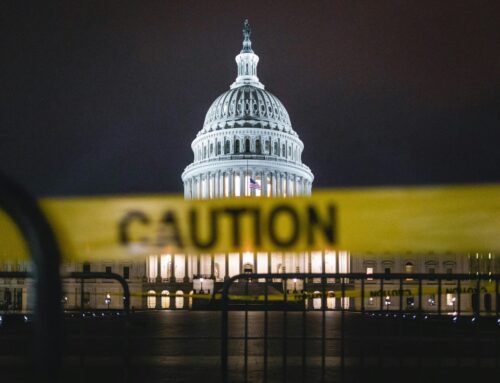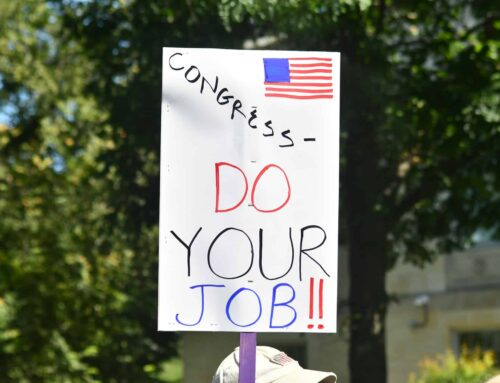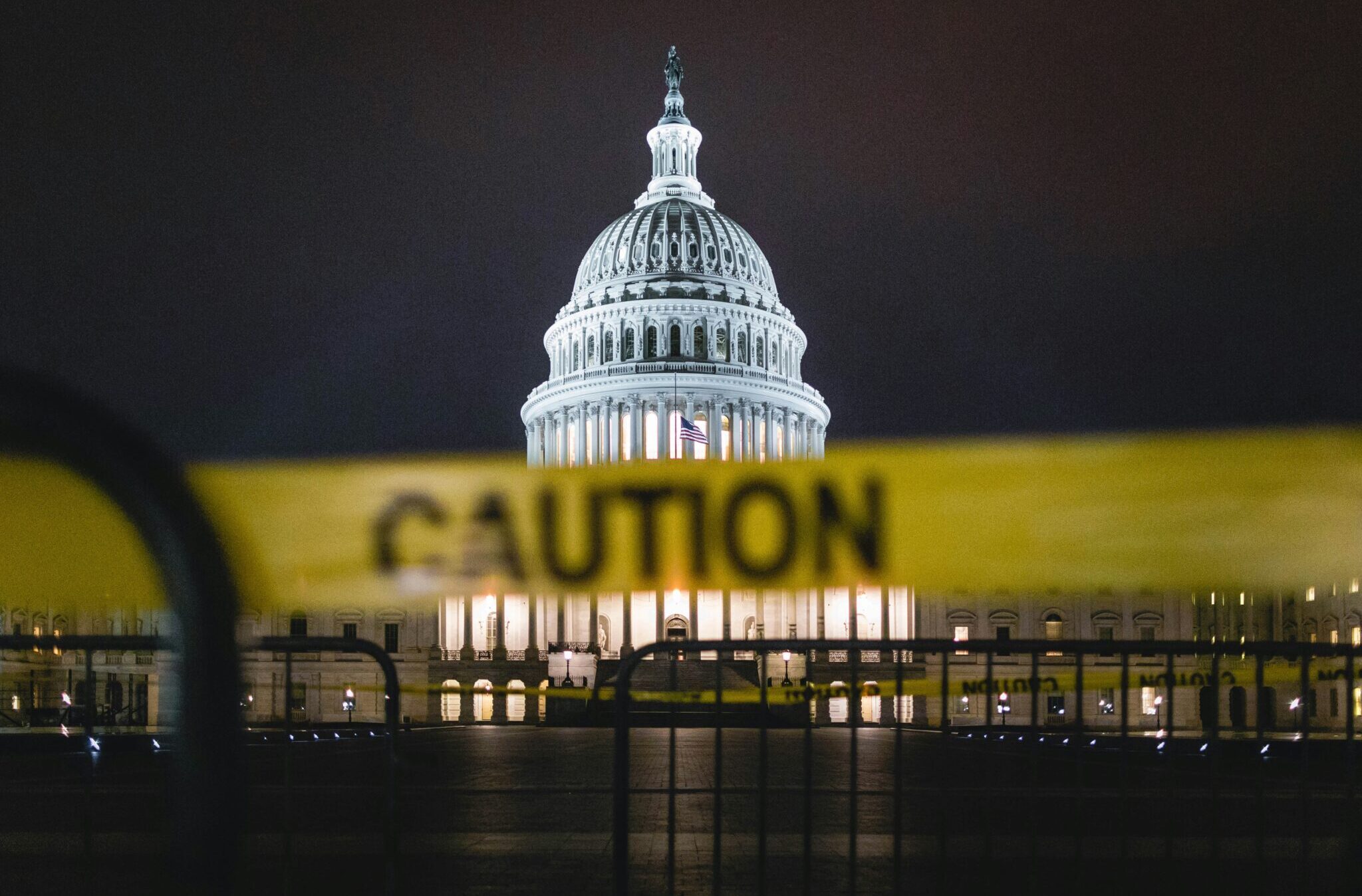The impasse in the divided and chaotic U.S. Congress over funding of the federal government has reached another inflection point. Join TCS President Steve Ellis and Director of Research and Policy Josh Sewell for a look at the costs and implications for taxpayers.
Transcript
Announcer:
Welcome to Budget Watchdog All Federal, the podcast dedicated to making sense of the budget spending and tax issues facing the nation. Cut through the partisan rhetoric and talking points for the facts about what’s being talked about, bandied about and pushed to Washington, brought to you by taxpayers for common sense. And now the host of Budget Watchdog AF TCS President Steve Ellis.
Steve Ellis:
Welcome to All American Taxpayers Seeking Common Sense. You’ve made it to the right place for over 25 years. TCS that’s taxpayers for common sense, has served as an independent nonpartisan budget watchdog group based in Washington dc We believe in fiscal policy for America that is based on facts. We believe in transparency and accountability because no matter where you are on the political spectrum, no one wants to see their tax dollars wasted as we come on the air today. Dear podcast listeners, the impasse and the divided and chaotic US Congress over funding for the federal government has reached yet another inflection point. It looks like the extra day they were afforded by leap year today is February 29th was enough time to extend the fiscal year 2024 spending and keep the government’s lights on for at least a couple more weeks. But we are not going to spend time today focusing on the politics or the players. Instead, we’re going to take you to the TCS Watchtower. The vantage point from which you can clearly see the real costs and implications of this impasse on watch for TCS is Josh Sewell, our director of policy and research. Josh, thanks for having all of us join you way up here.
Josh Sewell:
Hey Steve, it’s nice to get out of that budget bunker every once in a while. You can see everything from up here.
Steve Ellis:
You sure can. So Josh, it looks like federal funding is about to expire, but as I said at the top, it’s can kicking time again. Can you point out the landmarks for everyone in America’s 2024 fiscal landscape?
Josh Sewell:
Yeah, I can point them out, but I’m not going to venture a guess as to what path we’ll be taking to see these landmarks because we established I’m not good at prediction.
Steve Ellis:
I do believe you estimated that it was about a 99% chance we’d have a shutdown last year.
Josh Sewell:
I might’ve said 99.9. I was very confident or I guess not confident in Congress.
Steve Ellis:
Well, thankfully last September at the last minute, Congress did pass a continuing resolution to keep the government running
Josh Sewell:
And then they passed another one in mid-November and another one in January. So I’m over three on shutdown down opportunities, which I got to say is actually a good thing.
Steve Ellis:
Completely agree, Josh. So instead of another stab at predicting the future, how about some observations, Josh, from way up here in the TCS Watchtower, it kind of looks like there’s a train crash about to happen over there. It looks like one train is stopped and the other train is going to hit it from behind. What is that?
Josh Sewell:
So that train that’s barreling towards the stop train is the fiscal year 2025 federal budget.
Steve Ellis:
Right. The Biden administration announced they would be submitting their fiscal year 2025 budget request on March 11th days after the State of the Union and more than a week before the latest presumably passing CR for fiscal year 2024. It’s not that the ink won’t be dry on FY 24 spending bills, they won’t even be written.
Josh Sewell:
So five full months have passed in fiscal year 2024, and we don’t have a budget that’s frankly just annoying for us and the staffers I speak to in Congress, but it’s also costly. So agencies are currently operating under last year’s spending priorities, which frankly may not be the areas of need this year.
Steve Ellis:
And it delays hiring and travel and then you basically, once you get the spending bills halfway through the fiscal year, it’s a mad scramble to then get that money out the door in just five months or six months instead of 12.
Josh Sewell:
And speed isn’t always something you want from the government. Sometimes you do, but oftentimes not, especially making deliberate spending decisions, but also there’s a whole process to make budgets more transparent, more responsive, and to frankly give all of Congress a chance to inform those spending decisions.
Steve Ellis:
Because once you get to these continuing resolutions and then these mad dash and these spending bills, it’s not like Congress is actually legislating. It’s a few members hobbled together with the White House that are trying to figure out what’s the final deals and then it’s basically take it or leave it. And I’m glad that they’re taking it. But by the same token, it’s not the deliberative process and it’s not actually as you said, transparent.
Josh Sewell:
Yeah. And it basically gets you out of what’s supposed to be a regular budget process, which I don’t know if we’ve ever had a regular budget process since I started this or even since you started this a couple of years before I did. And so it really takes away the opportunity for all members of Congress to do their job, which is one of the few things they’re actually required to do under the constitution, which is to appropriate funds for our government. So we’re not having oversight hearings grilling the president, the House and the Senate aren’t debating their own budget resolutions. And so we’re just really far behind in the actual steps to get good informed spending decisions for those of us paying the bills.
Steve Ellis:
And as we were talking about with the Trane, I mean this inaction or inability to actually finalize these fiscal year 24 spending bills, which let’s be clear that the top line spending was agreed upon in the summer. And so really it’s just about how it fits in and some of these other priorities it gets in the way of getting to FY 25. I mean, I mentioned that the president says he is submitting his budget on the 11th. Maybe it’ll even be pushed back because the 24 bills won’t be done by then. But regardless, it was supposed to be submitted the first Monday in February under law. And so it’s already behind and it’s an election year, which is going to be messy regardless. So their failure on fiscal year 2024 spending has actually set them up for failure again on fiscal year 2025 spending.
Josh Sewell:
And maybe the most exasperating part of this is that the budget request and then the budget resolution, which is what actually what Congress, the House and the Senate are supposed to agree to a budget resolution which actually sets the spending levels. And the president doesn’t have to sign that ultimately he signs the spending bills. Yes. But to start the process off the resolution is an agreement between the House and the Senate. You can’t even start that process until the president has started it. I guess you technically could, but the way it’s always worked is the president says, this is what I think as a person who manages all the money that comes out, all these agencies, this is where I think we need to spend money this year. And Congress says, thanks, but no thanks and does their own thing, but then they actually have this process.
You can’t start any of this until you have a request. Take the time to grill the presidents the president on the request, and then the House and the Senate have to negotiate their own budget resolution. And as we’ve seen, even when Democrats control both chambers or Republicans control both chambers, they sometimes have a hard time coming to an agreement on a budget resolution. There’s very little this Congress can agree to. So they need some time to get that top level of spending agreed to, oh wait, they already did agree to it last year. This idea that yeah, we are behind schedule for the next year, but that’s because we’re behind schedule for last year because we haven’t agreed basically to accept that we made many of these decisions already. And by we, I mean Congress last June in the budget deal or in the debt ceiling deal. It’s frustrating. I don’t like to just complain, but it’s frustrating because it costs us money. It costs us time when we could be doing other things. $1.7 trillion is a lot of money. That’s about what we’re spending in the fiscal year 2024 budget. But there’s also a lot of money being left on the table not talked about.
Steve Ellis:
Right. Well, and to your point about the differences between even if they’re in the same control by the same party, I can remember a house Republican staff for a long time saying that the Democrats are the opposition, but the senate’s the enemy. So certainly the differences between the two chambers are real. And so you alluded mentioned the 1.7 trillion of discretionary spending, which is what this whole fight is about, and that’s really only about a quarter of the federal budget. So what are some of the other things that one of these issues when you have the soap opera, is it around fiscal year 2024 other important stuff doesn’t get done, including that other 75% looking at that?
Josh Sewell:
Yeah, absolutely. There are trillions of dollars going out the door that are not affected by the annual budget process, at least not immediately affected. And so you’re talking about all of those entitlement programs. And so there has been a turn by many in Congress to look at our long-term needs and our long-term challenges in spending because as we’ve harped on here, a number of times deficits have been rising. I think we’re at $1.6 trillion deficit for the last fiscal year, and they’re going to continue rising, and we’re going to have even greater challenges in, have greater challenges in social security, greater challenges in Medicare and Medicaid. And so Congress has to turn their attention to those at some point. And it’s not going to be quick. It’s not going to be easy. And if you don’t move on from when you’ve already made decisions on one part of the budget to the stickier parts, it’s really hard to see how we’re going to really get debt and deficits under control.
Steve Ellis:
Well, and we’ll talk about a little bit more about some of the entitlements and the debt and deficits here just in a minute or so, but there are some other deadline issues that are not necessarily even spending that are being blocked or held up through this impasse, right, Josh?
Josh Sewell:
Yeah, exactly. And that’s another thing. So there are plenty of other bills that govern the actions of agencies that don’t immediately affect funding and those things are expiring and Congress is not turning their attention to ensuring that those policies worked. So one of the things that’s immediately expiring is on March 8th, as of now, the FA a’s authorization is expiring. So technically the Federal Aviation Administration wouldn’t have authority to conduct its operations starting a week from now. So that means you’d have all kinds of things happening. So they would lose oversight activities. There wouldn’t be training for new pilots and other folks, and even some of the safety training and no fee collection, as much as we don’t like those add-on fees that some of those things that are charged, those actually pay for a number of things in the airport and airway trust fund. So basically how you have airports on how they are maintained, and you have a bunch of TSA workers on the job without a paycheck. And so that’s one of the most immediate things that would expire. And there’s other things as well.
Steve Ellis:
So like fisa, what’s
Josh Sewell:
That? So the Foreign Intelligence Surveillance Act that’s been around since post water eight, one of the numerous post Watergate bills, which essentially governs US surveillance, especially domestically, and it has major implications for privacy and national security. And so that expires on April 19th. And so Congress needs to get involved and figure out, and they’ve been debating this for I think a year and a half, this reauthorization of how to fix FISA or how to modify it in this next authorization. But those final decisions aren’t going to be made if you’re sitting all your time focusing on last year’s budget without even moving to this year’s budget. And also your favorite flood insurance yet again is about to expire.
Steve Ellis:
Right. I was going to bring that up. I figured Budget watch.af Faithful know that I’ve worked on flood insurance for a long time and trying to reform it. And really, I mean even if they do extend it, it’ll just be extending a program not actually trying to reform it. And they need to get to work on that as well because in serious need of reform to protect taxpayers and to discourage unwise development.
Josh Sewell:
And I think the big concern here is that I don’t want Congress to do work just to do work. I don’t want them to pass bills to say, Hey, we pass bills. And that’s not how we evaluate. You’ll see these numbers about how productive or unproductive a congress is based on the number of bills they pass, and that’s not the right way to do it. What we’re asking is that these are important issues. The programs and policies contained in these authorization bills are there for a reason. They were important enough to be done at one point. We need to look at ’em and see are they achieving the ends we want? Are they adjusting to the 21st century realities that we see now? And even how things are today, verse five years ago, you’re not having that if you’re spending your time, you’re not having any debate at all if you’re spending your time on something else. And so the big ask for me has been spending decisions are important. You have to make that every year those decisions were made last year, they’re not perfect. Some people want to spend less money, others want to spend more, but we’re at a level, let’s move on and take another bite at this apple next year. But we’re still trying to swallow the last year’s spending will. It just doesn’t make sense to me.
Steve Ellis:
It’s understandable that lawmakers are basically twiddling their thumbs, the rank and file lawmakers while the leaders try to figure out and spend all their time and energy on the fiscal year 24 spending bills. And so it makes a congress, and I know you said you shouldn’t measure by the number of post office namings or whatever happens in a congress, but by the same token, it’s just been plotting along and inaction and we’re going to end up basically not far away, if at all, away from where they were back in the summer. And so they’re not really accomplishing anything. And as you said, take what you got so far and move on because it’s an annual spending process. And so you deal with these each year. And then also you have to deal with, like you said, some of these other major programs that are in need of attention and reform and that are important debate.
I mean, the ones that you mentioned, FSA and FAA and flood insurance. Those are all legitimate issues that have controversy around them. Even in an FA where I think most people largely agree, we’d supported reforms in the past that basically general aviation, so like Taylor Swift’s private jet, they don’t actually contribute to the airport and aviation trust fund. And so certainly these are areas that should be examined. And I promised to the B watch faithful that we would get back and talking about the deficit and debt. So the national debt has surpassed 34 trillion. Josh, I think it’s about $34.3 trillion. How does that color the horizon for taxpayers?
Josh Sewell:
A debt level that high just makes it harder to do everything as if it was hard enough because it starts to make the math hard, not just the politics. And I looked up, we spent, I believe it was 659 billion on net interest last year. That’s just interest that doesn’t buy you anything but past spending decisions. And so we’re currently projected to spend 870 billion this year. And I think that pace is going to put us, I think we’re on the pace to have interest, just interest alone, it’s going to be the biggest federal department in just a couple years, even more than we spend on the Pentagon. It’s mind boggling
Steve Ellis:
And it’s accelerating because I used to say it would be at the end of this decade that interest would be more than the Pentagon, but it’s happening even sooner. It’s like your side view mirror that objects are closer than they appear, and then certainly that tipping point is there and obviously higher interest rates are a major part of that.
Josh Sewell:
And so I’m not trying to just complain about this, but I think it’s, and I strongly agree, people should have principles. That’s one of the things we ask members of Congress to have and to stand up for those. But there’s also a point where you have to say, I’ve gotten what I can get and we have other very important things to decide and to debate on, and so let’s move on from this spending debate and move to the next one because there are really important things that we have to work on. And I waited as long as I could, but I’ve been on the hill a lot lately, a lot more in the last few weeks. And I had been earlier and trying to talk to people about the Farm Bill, and we are a year and a half past when we should have normally done a farm bill debate.
And we’re still getting folks who are saying love to talk to you about the Farm Bill, but we got so many other things to deal with right now. It’s like, well, the farm bill’s going to expire in seven months too. And so it’s like we can’t even move on to these other things that are not just near and dear to me, but also very important for our economy and for millions, definitely thousands of real farmers and certainly millions of people who are involved here. And so it’s not just me, it’s also the people who work in Congress are getting frustrated and there is a path forward.
Steve Ellis:
Well, and earlier you talked about social security and Medicare and the pressures and it’s looming insolvency of social security and early in the next decade, and as we’ve obviously documented, Congress isn’t really good and at solving these long time, long horizon sort of issues. And so what are some of the things that we’ve talked about and that we think are important ways to go forward on trying to tackle these?
Josh Sewell:
I think this is just another great example of why we should ratchet down the partisanship and pull back on the press releases and move to a fiscal commission to really tackle these entitlement programs, these very important social safety net programs that a lot of people rely on. You’re not going to completely remove Congress, but Congress needs to accept that it’s not making the decision it needs to make, and we need to move to a fiscal commission that can be empowered to do things a little bit differently because things haven’t worked so far.
Steve Ellis:
Yeah, that’s an understatement. Josh. We talked about this fiscal commission on podcast 59, Josh, but watch Faithful. If you haven’t listened to that, you should go back and give it a listen. And it’s something that we take very seriously because really you’re handing off the responsibility to do some of these things that Congress is supposed to do simply because Congress has proven themselves incapable of doing that in regular order as a regular body. And so this would be something that would be bicameral, bipartisan, evenly stacked that would actually come up with some solutions and then actually Congress would have to vote on those solutions. And so it’s certainly a path forward and really I think only viable path forward at this point to deal with Medicare and social security. And I saw that recently, budget committee chairman Jody Arrington said that tax increases revenue has to be on the table. And we think that’s important too. And that’s again, something where the only way to maybe deal with some of that that seems like a third rail in politics, is to actually have some sort of commission like this and then they end up voting it up or down.
Josh Sewell:
Yeah, I completely agree. And I have my family focus group that I go back to to try to figure out people who aren’t in this watchtower here in DC and maybe we’re too in the weeds at so times fully acknowledge that, but I think it’s pretty clear it’s not just us who are frustrated. I mean there are a lot of voters who are frustrated. There are a lot of folks who are tuning out because they’re so frustrated and we just need something different. And I think a fiscal commission is a great way to allow members of Congress to focus on something else. Frankly, they can spend more time on that annual budget while the experts, which will include members of Congress and some outside experts, as the way the commission is proposed now can really make those tough choices and they can have some of those debates and then present a plan and it’s a great way to move forward.
Steve Ellis:
Yeah, Josh, I mean, it’s basically when something isn’t must pass, it’s impasse and that’s the reason why Congress needs to hand over a fiscal power of attorney to this commission to make some of these decisions on their behalf. Josh, we’ve been talking a lot about fiscal year 24. I guess we’re just like Congress still talking about fiscal year 24 spending, but fiscal year 25, but there was another sort of momentous occasion just announced February 28th that Senate minority leader, Republican leader, McConnell Republican from Kentucky is not going to stand for reelection as the Republican leader for the next Congress. Just wanted to know if you had any thoughts on Leader McConnell’s longest tenure of any leader, Democrat or Republican in the Senate and what that legacy is?
Josh Sewell:
Well, I think it’ll certainly, whether you like him or hate him, he had a significant impact on Washington and the country. And so it’s going to be very different with him not in a leadership role moving forward. And it’s going to be an interesting race between the Johns right now. It appears three Johns will be vying to be the majority leader. It’ll be a new different era for Washington. I
Steve Ellis:
Don’t know if you noticed that, Josh, but you made a prediction. It sounds like you think the Republicans are taking over the Senate, you said, for majority leader. So all right. You tried to avoid making a prediction, but you didn’t, and we’ll hold you to that come November. All right here from the Watchtower, Josh Sewell, on behalf of American taxpayers, let me say thank you. We need you on that wall. We can handle the truth.
Josh Sewell:
Alright, thanks Steve.
Steve Ellis:
Well, there you have at podcast listeners impasse. Stay tuned. We’re all in this together. This is the frequency. Mark it on your dial, subscribe and share and know this taxpayers for common sense has your back America. We read the bills, monitor the earmarks, and highlight those wasteful programs that poorly spent our money and shift long-term risk to taxpayers. We’ll be back with a new episode soon. I hope you’ll meet us right here to learn more.










